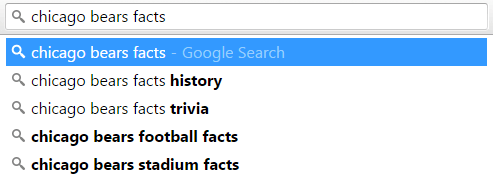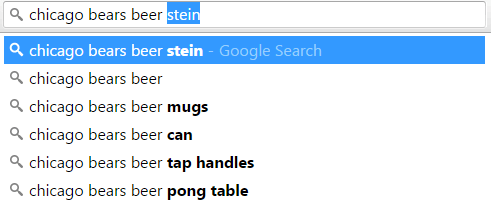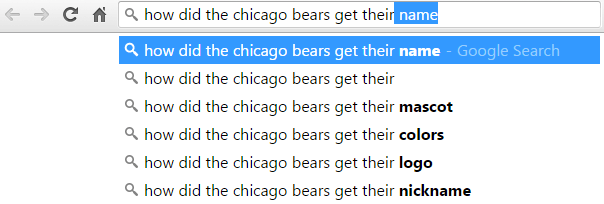
4 Incredibly Powerful Keyword Research Tips
Updated last on:
January 25, 2023
Can’t find the right keywords for your website? Don’t rely on the basics of a keyword research tool. Use these 4 tips to discover a goldmine of keywords.

by Eric Sharp
TOPICS:
Keyword research is laborious!
Finding the best keywords for your website takes tools, patience, and keen knowledge of your products or services. The process can be exciting (many keywords to choose from) or be exhausting (few keywords to choose from).
Entry level keyword research
Entry level SEOers rely on one general technique: using the basics of a keyword research tool. They search for keywords, quickly select ones with the highest volume, and unmindfully proceed to optimizing the website with those keywords.
Expert level keyword research
More experienced SEOers equip themselves with many more techniques. They find keywords through a variety of tools and resources, evaluate those keywords carefully, and proceed slowly toward optimization.
If you haven’t experimented outside the core features of an SEO tool, these 4 keyword research tips are for you. They are both uncommon and powerful. Utilize a few of these tips the next time you’re searching for keywords, and you’ll find the perfect balance of quantity and quality to optimize your website for the search engines.
Thoughts on keyword research tools

Two of the four tips below will require you to use a keyword research tool.
I use Ahrefs and SEMRush for almost everything (requires paid registration). But, there are many other tools out there like Google’s Keyword Planner (free), Wordtracker, and Keyword.io. I encourage you to experiment with a variety tools since they’re all a little different in the data they provide. SEMRush quickly gives me the insights to accomplish tips 1 and 2. Tips 3 and 4 don’t require the use of a keyword tool and just depend on using Google in a way you’ve probably overlooked.
Now, let’s explore these 4 techniques in more detail.
Keyword Tip #1: Pull keywords from your competitors’ websites
If you can’t beat ’em, join ’em.
Plenty of times I’ve been stuck in the mind-numbing process of keyword research. We work with a lot of niche businesses, so it can challenging to find keywords relative to their specialized products and services.
Until we look at their competitors’ rankings.
If your competitors’ websites possess decent authority and been somewhat heedful with their SEO, this data could quickly turn a hopeless conversation into a very exciting one.
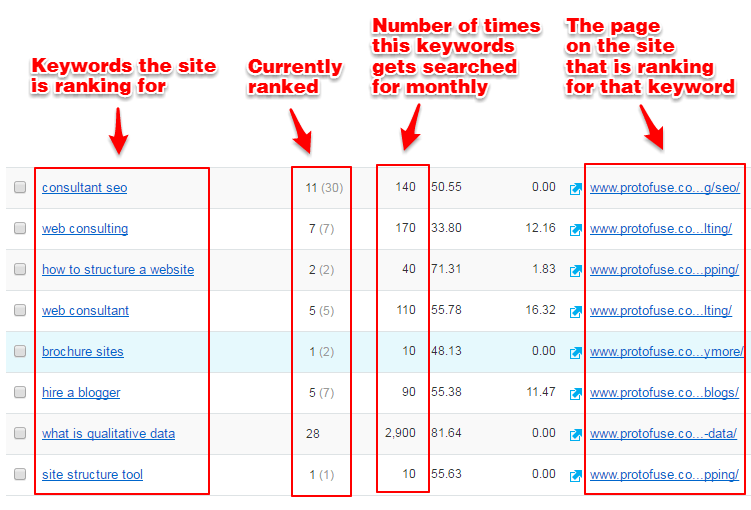
The key here is to focus on non-branded keywords. Keywords related to the competitor’s name or branded products are obviously not helpful for your website.
Keyword Tip #2: Run a keyword report on an industry-related website
I love this technique when coming up with blog ideas for my clients.
Industry-related websites, like online magazines or associations, typically generate a lot of content on a regular basis to appease advertiser demands.
Since their content marketing engine is revved high, these types of websites usually rank well for many different keywords. Keywords that could be extremely relevant to your own website.
But, be prepared to sort through A LOT of keyword data. Most of these industry-related websites are ranking for thousands of keywords. I mentioned earlier that keyword research requires patience. This tip will require you to practice it.
Let this moose inspire you.
Keyword Tip #3: Google’s “Related Searches” at bottom of Search Results page
Let’s say I’m preparing for the 2016 NFL kickoff (which is in 63 days, if you’re curious). In honor of a fresh season with high aspirations, I decide it’s time to buy some new apparel. So, I google this:
If I then scrolled down to the very bottom of Google, I’ll find the “Related Searches” section.
Google is presenting other similar keywords based upon my original search term. I started with “chicago bears apparel” and they’re showing me other long-tail keywords that may help me narrow down websites more specific to my needs (e.g. chicago bears vintage apparel).
Basically, you’re leaning on Google (which isn’t a bad thing) to help you research keyword ideas. This screams opportunity. And it’s fast. And free!
Note: This exercise requires you to start with a particular keyword. If you have a handful of keywords already and want more, this method will help you gather more quickly.
Keyword Tip #4: Use Google Suggest
Google Suggest (aka “Auto-complete”) was introduced in 2007 and quickly become a core feature. You’ll see something like this every time you google:
Google is attempting to suggest the best matching search queries for what you’re entering in real-time. Generally you’ll see 3-5 suggestions, sometimes even up to 10 are displayed. Here’s Google’s official description:
Autocomplete predictions are automatically generated by an algorithm without any human involvement based on a number of objective factors, including how often past users have searched for a term.
Aside from helping searchers, Google Suggest can be an option for finding great keywords for your website.
If your business is offering a product, fire up a search around your products and see if referenced in different ways (e.g. beer stein vs beer mugs).
If offering a service, append “service” or “services” to your query and see what shows up.
If wanting to generate helpful content in your blog, use “how” in your search query and pinpoint questions people are asking…then answer them in your blogs!
Google Suggest is a great technique to start the momentum on your keyword research. If you’re stuck and making no headway, use this tip to energize yourself.
Google Suggest advanced tip
If wanting to get super nerdy, use wild cards in your search terms such as an underscore (_) to get more suggestions in the middle of a keyword phrase.
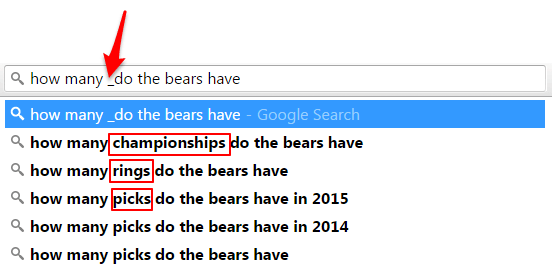
Note that not every wild card search will work. Sometimes there’s not enough volume and Google defaults to its usual suggestions.
Keyword research requires multiple techniques & tools
As the saying goes, “There’s more than one way to skin a cat.”
Very rarely will a single keyword research tool be sufficient for the job. I’m consistently using multiple tools and techniques to find the right data to optimize my client’s websites. As you begin to experiment and familiarize yourself with these techniques, you’ll start to learn the strengths of each.
Remember though, keyword research starts with understanding the website’s audience first and foremost. Don’t get enamored with sexy keywords that have high search volume. The goal is to drive qualified traffic. Not just traffic.
Focus on the right keywords.
Happy researching!
Need website help?

We're all about websites — especially websites that are loved by people and Google.
Since 2001, we've been helping clients nationwide turnaround their outdated and under-performing websites.

"Our website is generating quality leads every week thanks to their website consulting."
Steve L.
Cactus Technologies
Hey, you made it!
There is gobs of information available today — I'm honored you found this article interesting enough to make it here. I hope this insight leads you to a better-performing website!


About the Author
Eric Sharp is the founder of ProtoFuse and has been in the website trenches since 1999 — right before the dot-com boom redefined the website landscape. Since then, he's accumulated 25 years of digital marketing experience and prides himself on creating websites "Loved by people and Google". Outside of websites, it's all about fam time with his wife and 3 kids. He enjoys CrossFit, cooking steak on his cast iron skillet, collecting Jordan sports cards, and Daaa Bears.


